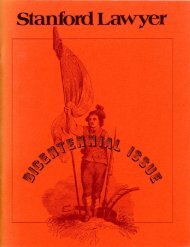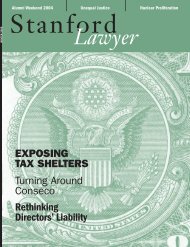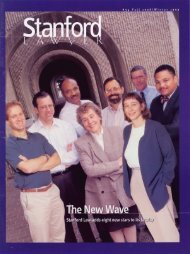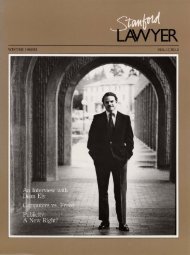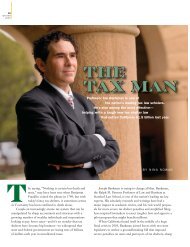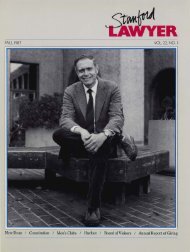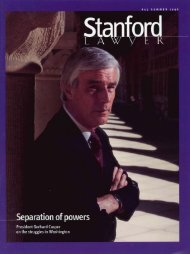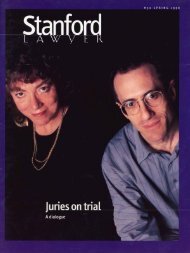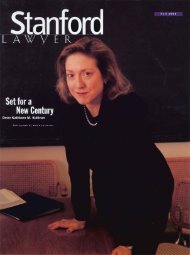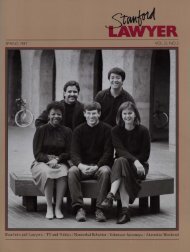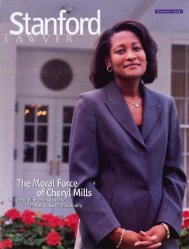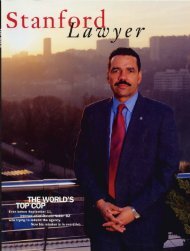Issue 73 - Stanford Lawyer - Stanford University
Issue 73 - Stanford Lawyer - Stanford University
Issue 73 - Stanford Lawyer - Stanford University
You also want an ePaper? Increase the reach of your titles
YUMPU automatically turns print PDFs into web optimized ePapers that Google loves.
CHANGING THE WORLD<br />
27<br />
STANFORD<br />
LAWYER<br />
Assistant professor of law Jenny<br />
S. Martinez had hoped that<br />
the case she argued for amici<br />
curiae, Hwang Geum Joo v. Japan,<br />
would provide a small consolation<br />
to a group of women who experienced<br />
a nightmare 60 years ago.<br />
No such luck: the U.S. Court of Appeals for<br />
the District of Columbia decided June 28 that the<br />
case, in which World War II “comfort women” were<br />
asking Japan for reparations, was a matter for politicians,<br />
not the courts. The court cited the political<br />
question doctrine, saying that the postwar treaty the<br />
United States signed with Japan negated lawsuits<br />
arising from the war.<br />
The 15 appellants, from China, Taiwan, South<br />
Korea, and the Philippines, were among thousands of<br />
women kidnapped during the war, enslaved, and forced<br />
to work as prostitutes for the Japanese military. Japan<br />
has never formally apologized for its actions.<br />
“These women are very brave to come out and talk<br />
about an extremely painful experience,” Martinez said.<br />
“Some are in their 90s now, and they wanted some<br />
acknowledgement of what happened to them before<br />
they died.”<br />
PHOTO: STEVE GLADFELTER<br />
JENNY MARTINEZ: ENDING SEXUAL TRAFFICKING<br />
Martinez first argued the case in 2000, when<br />
she was an associate at Jenner & Block LLP in<br />
Washington, D.C. Though the court dismissed the<br />
case, the U.S. Supreme Court summarily reversed its<br />
decision based on another World War II case and sent<br />
it back to appeals court, at which point Martinez picked<br />
it up again.<br />
Though the women are pursuing their goal through<br />
diplomacy and other tactics, Martinez said their fight in<br />
the U.S. court system—which allows individuals to sue<br />
foreign governments under the Alien Tort statute—is<br />
very likely over.<br />
However, Martinez added that the ruling did contain<br />
a silver lining, as the court left open the possibility<br />
that other victims of sexual slavery could sue foreign<br />
states in U.S. courts under the Alien Tort statute. “One<br />
of the reasons I thought the case was important was<br />
that sex trafficking today is a big problem and governments<br />
are involved in it,” Martinez said.<br />
“Jenny contributed an enormous amount to this<br />
case,” said Martina Vandenberg, a Jenner & Block associate,<br />
who was previously an expert on sex trafficking<br />
at Human Rights Watch. “Jenny’s legal work definitely<br />
blazed a trail. The legal arguments have been made to<br />
allow other victims to sue.”—Mandy Erickson<br />
KATHLEEN SULLIVAN: CREATING A PRACTICE<br />
Three months after stepping down<br />
as dean of <strong>Stanford</strong> Law School,<br />
Kathleen M. Sullivan received an<br />
unusual package in the mail. Inside<br />
were a new laptop, a BlackBerry, a<br />
stack of business cards imprinted with<br />
her name, a bottle of fine champagne, and a<br />
case file. The sender, Los Angeles–based Quinn<br />
Emanuel Urquhart Oliver & Hedges, LLP, had<br />
an intriguing proposal: Would Sullivan be willing<br />
to use part of her sabbatical to help the commercial<br />
litigation firm build a West Coast appellate<br />
department that would rival the established players<br />
in Washington, D.C.<br />
It didn’t take Sullivan, Stanley Morrison<br />
Professor of Law, long to accept. Before she<br />
PHOTO: LINDA A. CICERO<br />
became one of the nation’s premier constitutional<br />
scholars, Sullivan had developed a passion for litigation<br />
and has cultivated that interest throughout<br />
her academic career, handling two or three appellate<br />
cases a year. In May she won a major victory<br />
for California vintners in a case before the U.S.<br />
Supreme Court, arguing that wineries should be<br />
allowed to ship directly to consumers living out of<br />
state. “I’ve always viewed my litigation sideline as<br />
not only compatible with, but a huge contributor<br />
to my teaching and research,” she explained. “You<br />
cannot possibly overestimate how much students<br />
love having real world experiences imparted to<br />
them in the classroom.”<br />
Since becoming of counsel to Quinn Emanuel<br />
in January, Sullivan has kept up with the academic




